
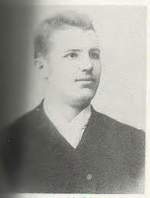
1882 Hitler family: Franziska 'Fanni' Matzelberger, Alois Hitler's fancy woman, gives birth to Adolf Hitler's older half-brother, Alois Jr. (See May 22) [For further details, Click here.]
1898 French author Emile Zola publishes his "J'accuse" letter:
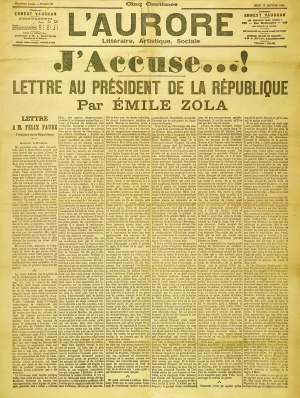
He accuses the French government of a cover-up in the Alfred Dreyfus treason case. [For further details, Click here.]
1915 World War I: Various:
South West Africa: South African troops under Louis Botha occupy Swakopmund.
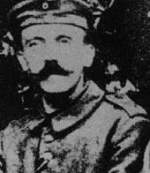
Gefreiter Adolf Hitler's 16th RIR [List Regiment] now has a peak combat strength of 28 officers and 1,788 NCOs and men. With one man for every two meters of front, the cold winter weather begins to take a greater toll on the men than does the continual artillery and mortar fire. [For further details, Click here.]
1916 World War I:Various:
Lazare Muskovitch—the Montenegro Prime Minister—on Montenegro's Conduct of the War:
When Montenegro entered the war on the side of the Allies she was promised everything necessary for the army, and also for the civil population, because even in ordinary times they imported wheat. Russia and France were to furnish supplies, but, unfortunately, this promise could not be carried out. They did what they could, but it was much less than Montenegro needed, alike in arms, artillery, and munitions, and, above all, in food. Montenegro was given the task of protecting the rear of the Serbian army, and its battalions defended the Sandjak frontier with such success that on this side the Serbians were given time to retire. [For further details, Click here.]
In an attempt to relieve their compatriots under heavy siege by Turkish forces at Kut-al Amara in Mesopotamia, British forces under the command of Lieutenant General Fenton Aylmer launch an attack against Turkish defensive positions on the banks of the Wadi River.
1920 Rocketry: From The New York Times, reacting to a January 11 announcement by the Smithsonian Institution:
As a method of sending a missile to the higher, and even highest, part of the earth's atmospheric envelope, Professor Goddard's multiple-charge rocket is a practicable, and therefore promising device. Such a rocket, too, might carry self-recording instruments, to be released at the limit of its flight, and conceivable parachutes would bring them safely to the ground. It is not obvious, however, that the instruments would return to the point of departure; indeed, it is obvious that they would not, for parachutes drift exactly as balloons do. And the rocket, or what was left of it after the last explosion, would have to be aimed with amazing skill, and in dead calm, to fall on the spot where it started.
But that is a slight inconvenience, at least from the scientific standpoint, though it might be serious enough from that of the always innocent bystander a few hundred or thousand yards away from the firing line. It is when one considers the multiple-charge rocket as a traveler to the moon that one begins to doubt and looks again, to see if the dispatch announcing the professor's purposes and hopes says that he is working under the auspices of the Smithsonian Institution. It does say so, and therefore the impulse to do more than doubt the practicability of such a device for such a purpose must be well, controlled. Still, to be filled with uneasy wonder and express it will be safe enough, for after the rocket quits our air and and really starts on its longer journey, its flight would be neither accelerated nor maintained by the explosion of the charges it then might have left. To claim that it would be is to deny a fundamental law of dynamics, and only Dr. Einstein and his chosen dozen, so few and fit, are licensed to do that.
That Professor Goddard, with his "chair" in Clark College and the countenancing of the Smithsonian Institution, does not know the relation of action to reaction, and of the need to have something better than a vacuum against which to react—to say that would be absurd. Of course he only seems to lack the knowledge ladled out daily in high schools.
But there are such things as intentional mistakes or oversights, and, as it happens, Jules Verne, who also knew a thing or two in assorted sciences—and had, besides, a surprising amount of prophetic power—deliberately seems to make the same mistake that Professor Goddard seems to make. For the Frenchman, having got his travelers to or toward the moon into the desperate fix riding a tiny satellite of the satellite, saved them from circling it forever by means of an explosion, rocket fashion, where an explosion would not have had in the slightest degree the effect of releasing them from their dreadful slavery. That was one of Verne's few scientific slips, or else it was a deliberate step aside from scientific accuracy, pardonable enough of him in a romancer, but its like is not so easily explained when made by a savant who isn't writing a novel of adventure.
All the same, if Professor Goddard's rocket attains a sufficient speed before it passes out of our atmosphere—which is a thinkable possibility—and if its aiming takes into account all of the many deflective forces that will affect its flight, it may reach the moon. That the rocket could carry enough explosive to make on impact a flash large and bright enough to be seen from earth by the biggest of our telescope—that will be believed when it is done. See: July 17, 1969. [See: Wunderwaffen: Hitler's Deception and the History of Rocketry.]
1923 Weimar: Ruhr: After an announcement of passive resistance by the Germans to the French occupation, Hitler refuses to join the call for government-organized resistance and denounces the Weimar Republic and the 'November Criminals' as 5,000 storm troopers demonstrate in Germany. While this policy will puzzle and disillusion many of his suppoters, it will eventually be seen as a clever move as it places the blame on the "internal enemies" that Hitler is trying to discredit.
1928 Wunderwaffen: The British War office abolishes the lance as a weapon of battle [Poland did not follow suit].
1935 Saar Plebiscite:
The Territory of the Saar Basin (in French: Le Territoire du Bassin de la Sarre, in German: Saarbeckengebiet), also referred as the Saar or Saargebiet, was a region of Germany that was occupied and governed by Britain and France from 1920 to 1935 under a League of Nations mandate, with the occupation originally being under the auspices of the Treaty of Versailles. Its population in 1933 was 812,000, and its capital was Saarbruecken. It corresponds to the modern German state of Saarland, but is slightly smaller in area. After a plebiscite was held in 1935, it was restored to Germany. [For further details, Click here.]
1942 Various:
Barbarossa: Russians recapture Kiev. (Clark II) [See: What Were Adolf Hitler's Major Blunders?]
World War II: Germans begin a U-boat offensive along east coast of USA.
Allies promise prosecution of war criminals:
On this day, representatives of nine German-occupied countries meet in London to declare that all those found guilty of war crimes would be punished after the war ended. Among the signatories to the declaration were Polish Gen. Wladyslaw Sikorski and French Gen. Charles de Gaulle. The core of the declaration was the promise of "the punishment, through the channels of organized justice, of those guilty of, or responsible for, these crimes, whether they have ordered them, perpetrated them, or participated in them."
Knowledge of German atrocities occurring in Poland and Russia were reaching both the Allied governments and the exiles from the countries in which the butchering of innocents was taking place. News of Jews, political dissidents, and clergy being systematically murdered, tortured, or transported to labor camps as the Nazi ideology advanced along with Hitler's armed forces increased the resolve and solidarity among the Allies to defeat the Axis. (History.com)
President Franklin D. Roosevelt establishes the U.S. War Production Board, with business executive Donald M. Nelson as its chairman.
This was not the first time Roosevelt called on Nelson. In 1940, the president asked Nelson, then executive vice president of Sears, Roebuck and Co., to head up the National Defense Advisory Commission. As Roosevelt established agency after agency to coordinate the transition of industry from peacetime to wartime production, Nelson skipped among jobs, becoming director of purchases for the Office of Production Management and, in August 1941, director of the Supply Priorities and Allocations Board. The War Production Board, created to establish order out of the chaos of meeting extraordinary wartime demands and needs, replaced the Supply Priorities and Allocations Board.
As chairman, Nelson oversaw the largest war production in history, often clashing with civilian factories over the most efficient means of converting to wartime use and butting heads with the armed forces over priorities. Despite early success, Nelson made a major judgement error in June 1944, on the eve of the Normandy invasion, when he allowed certain plants that had reached the end of their government/military production contracts to reconvert to civilian use. The military knew the war was far from over and feared a sudden shortage of vital supplies. A political battle ensued, and Nelson was eased out of his office and reassigned by the president to be his personal representative to Chiang Kai-shek in China. (History.com)
1943 World War II: Various:
Stalingrad: Karpovka airfield is captured. This is the most westerly of the seven airfields in the pocket. (THP)
Stalin to FDR::
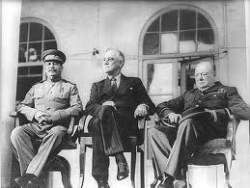
Thank you for your decision to send 200 transport planes to the Soviet Union . . . . I was rather surprised at your proposal that General Bradley should inspect Russian military objectives in the Far East and elsewhere in the USSR. It should be perfectly obvious that only Russians can inspect Russian military objectives, just as US military objectives can be inspected by none but Americans. There should be no unclarity in this matter . . . . My colleagues are upset by the fact that the operations in North Africa have come to a standstill and, I gather, for a long time, too. Would you care to comment on this matter?
Schenk, a German test pilot, required its use when his He 280 refused to separate from the tow aircraft due to the cable release mechanism icing up. As a precaution, Schenk ejected and landed safely. The tow was being made because the He-280 was powered by two Argus pulse-jets that required a high forward speed to start up. The first ejection seat was made by Heinkel, for the
1944 Various:
Concentration camps: Konrad Morgen, a 34-year-old SS magistrate, brings 800 cases of corruption and murder in the concentration camps to trial. Two hundred will result in sentences and the commandants of camps at Buchenwald and Majdanek, among others, are executed. (THP)
World War II: In Switzerland, Hans Bernd Gisevius and his Abwehr associate Eduard Waetjen begin supplying Dulles with information about the German resistance's plans for a coup against Hitler. (THP)
1945 World War II: Various:
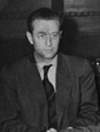
Hans Fritzsche: From a radio speech:
If Jewry provided a link between such divergent elements as plutocracy and Bolshevism and if Jewry was first able to work successfully in the democratic countries in preparing this war against Germany, it has by now placed itself unreservedly on the side of Bolshevism which, with its entirely mistaken slogans of racial freedom against racial hatred, has created the very conditions the Jewish race requires in its struggle for domination over other races . . . . Not the last result of German resistance on all the fronts, so unexpected to the enemy, is the fruition of a development which began in the prewar years, that is, the process of subordinating British policy to far-reaching Jewish points of view. This development started long before this when Jewish emigrants from Germany commenced their warmongering against us from British and American soil . . . . This whole attempt, aiming at the establishment of Jewish world domination, was obviously made at a time when the national-racial consciousness had been too far awakened to promise such an aim success.
[See: How Did Hans Fritzsche Avoid the Noose?]Poland: German defense lines all along the Polish front are devastated by the strength of the Soviet advance. [See: The Last Days of the Third Reich.]
1950 Cold War: Soviets boycott United Nations Security Council:
For the second time in a week, Jacob Malik, the Soviet representative to the United Nations, storms out of a meeting of the Security Council, this time in reaction to the defeat of his proposal to expel the Nationalist Chinese representative. At the same time, he announced the Soviet Union's intention to boycott further Security Council meetings. [For further details, Click here.]
1953 Various:
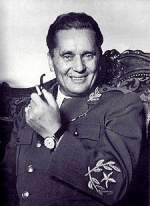
Marshal Josip Tito is elected president of Yugoslavia.
The so-called 'Doctors' Plot' surfaces in the Soviet Union: Tass claims that nine 'terrorist doctors' have been arrested for hastening the deaths of Politburo members by falsifying diagnoses and prescribing harmful treatments. Note: The entire affair is a paranoid delusion in the mind of the senile Stalin. [See: Worst Dictator of Modern Times: Hitler or Stalin?]
1957 Spandau Prison: From Spandau: The Secret Diaries, by Albert Speer:
[Rudolf] Hess seemed to think hard. Then he dropped into his whining tone. "But that is dreadful . . . . Then I have lost my memory." His eyes held a cunning expression. "Don't worry about it, Herr Hess. In Nuremberg, during the trial, you also lost your memory. After the trial it came back." Hess pretended astonishment. "What's that you say? It will come back?" I nodded. "Yes, and then it goes away again. The same thing happens to me." Hess was irritated. "What, to you too? What don't you know?" I looked at him thoughtfully, as if I were trying to figure something out. Then I shrugged resignedly. "At the moment I simply cannot remember who you are and what you are doing here." For a moment Hess was perplexed. Then we both began to laugh. (Speer II) [See: Was Rudolf Hess 'Crazy'?]
1992 Japan apologizes for forcing tens of thousands of Korean women to serve as sex slaves for Japanese soldiers during World War II.
1993 Erich Honecker: Former East German leader, under whose regime the Berlin Wall was built, leaves a Berlin prison to fly to Chile after a court frees him because he is near death.
Edited by Levi Bookin (Copy editor)
levi.bookin@gmail.com
FAIR USE NOTICE: This site may contain copyrighted material the use of which has not always been specifically authorized by the copyright owner. We are making such material available in our efforts to advance understanding of historical, political, human rights, economic, democracy, scientific, environmental, and social justice issues, etc. We believe this constitutes a 'fair use' of any such copyrighted material as provided for in section 107 of the US Copyright Law. In accordance with Title 17 U.S.C. Section 107, the material on this site is distributed without profit to those who have expressed a prior interest in receiving the included information for research and educational purposes. If you wish to use copyrighted material from this site for purposes of your own that go beyond 'fair use', you must obtain permission from the copyright owner.
Please note that the list-owner and the moderators are not responsible for, and do not necessarily approve of, the random ads placed on our pages by our web server. They are, unfortunately, the price one pays for a 'free' website.